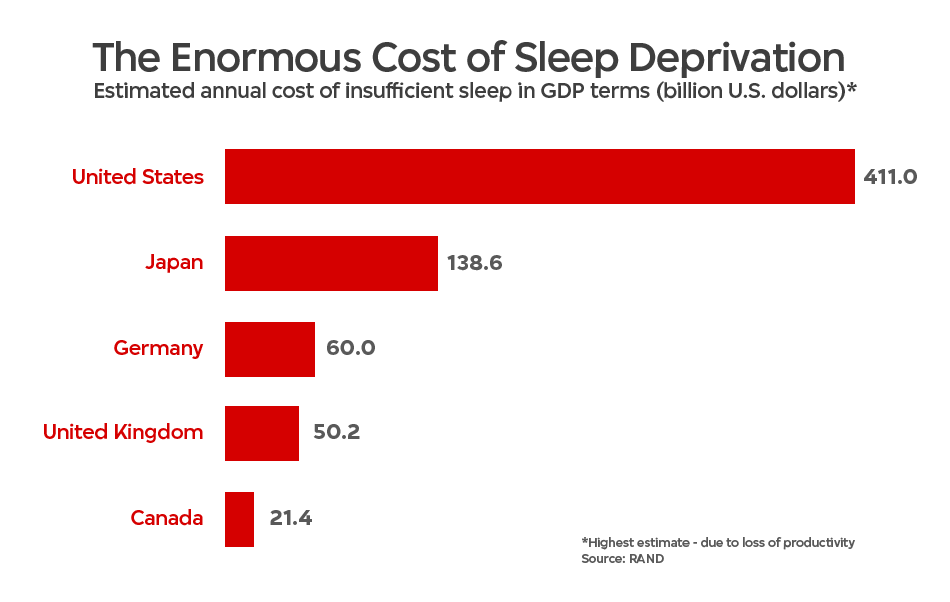In Japan, it is not uncommon to pass by a worker’s desk and find said worker asleep. In fact, an employee with their eyes shut and head on their desk is not a sign of laziness, but rather that they have worked themselves to the point of exhaustion, an admirable goal. Japan is known for harboring a bustling work environment, lending roughly six hours of sleep on average to workers per night following work days. Today, many employers have welcomed the concept of providing space and time at work for work naps, believing that these breaks will lead to better work performance.
The importance of sleep and the body’s functionality without it has been a long-standing topic of discussion and debate. Research suggests that without a sufficient amount of sleep, the body’s immune system weakens, the memory becomes impaired, concentration, decision-making, and problem-solving skills all become muffled, mood and libido are thrown off regular course, and skin visibly suffers. According to Justin McCurry’s observation of the expanding Japanese work and nap culture, workers feel a noticeable improvement in performance following the addition of naps to their routine.
While American workers are comparably some of the most sleep-deprived in the world, getting enough sleep is generally not seen as a priority or a concern. At this point, the apathetic attitude of Americans regarding proper sleep has brought about repercussions reaching beyond a negative stigma for the country. According to a recent study by Rand Europe, the U.S. economy is losing roughly $411 billion each year as a result of sleep-deprived employees. The days and productivity lost translate to 2.28 percent of the country’s GDP, while Japan is losing 2.92 percent of its GDP to the same issue.
Employers must recognize that supporting the well-being of their employees is in the best interest of the entire company. Instead of enforcing long hours and encouraging any means to “get the job done,” employers should emphasize the importance of proper sleep and focus on the utility that well-rested employees offer the company, community, and country as a whole.
For those working for a company that does not yet welcome nap culture, it is especially important to embrace healthy sleeping patterns as much as possible. Aside from quantity, the quality of sleep also has a strong influence on a person’s nightly rejuvenation and daily productivity. Waking up in the middle of the night can disrupt truly beneficial sleep.; consider the following steps for a good night’s rest that will lead to success at work:
Points to note for a good night’s sleep
Keep a consistent sleep schedule
Giving structure to the start and end of the day will sync the biological clock. Battle the temptation to sleep in on weekends and train the body to wake up at the same time every day, including days off.
Keep electronic devices away
This includes keeping televisions, laptops, and cellphones out of the bedroom area and out of sight an hour before sleep. This will keep distractions and disruptive lights at bay. A healthy alternative would be switching to reading or meditating before bed to promote physical and mental health that can aid in rich sleeping patterns and feed the soul.
Exercise earlier
Avoid activities like working, eating, drinking alcohol, and exercising for at least half an hour to an hour before winding down. These activities will only wake the body and mind and prolong the process of settling into slumber.
Do something else
If you can’t fall asleep after 20 to 30 minutes, try getting up to do something calming. Tossing and turning will only increase anxiety and prolong sleep.
Consider therapy
If problems with sleep persist, consider discussing the issues with a trained professional. Cognitive behavioral therapy has been proven to aid those who suffer from insomnia, especially if issues are rooted in stress, depression, or anxiety.
Practicing and maintaining proper sleeping habits should be a serious point of emphasis not only for Americans but workers worldwide. Though it may seem that putting in excessively long hours or pushing oneself past to the point of exhaustion would be advantageous, the reality is that humans simply can’t function optimally without a proper night’s rest. A paradigm shift regarding proper sleeping habits for the working individual will undoubtedly stimulate cognitive function, increase productivity, and generally improve temperament; and employers must do their part to highlight the importance of proper sleep and promote healthy lifestyle choices as means of maximizing yield.


